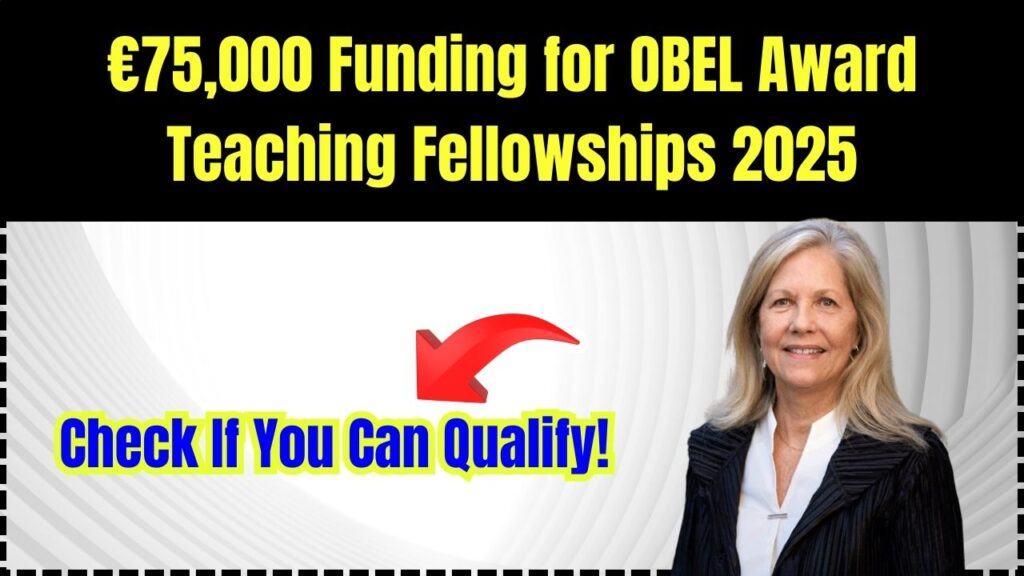€75,000 Funding for OBEL Award Teaching Fellowships 2025: In an inspiring move to reshape architectural education and promote sustainability in the built environment, the OBEL Award has announced its 2025 Teaching Fellowships. Each fellowship offers up to €75,000 in funding and is open to experienced professionals ready to contribute innovative ideas to academic environments. The theme for 2025, “Ready Made,” focuses on reimagining how we use what already exists—building sustainability through creativity.

This opportunity is ideal for professionals in architecture, design, urban planning, or similar fields who are eager to share knowledge, collaborate with a university, and lead change in how the built environment is taught.
€75,000 Funding for OBEL Award Teaching Fellowships 2025
| Feature | Details |
|---|---|
| Funding Amount | Up to €75,000 per fellowship |
| Fellowships Available | 2 |
| Application Deadline | August 1, 2025 (midnight CEST) |
| Start Date | Courses should ideally commence in 2026 |
| Eligibility | Professionals (min. 5 years’ experience) + Accredited academic host institution |
| Course Theme | “Ready Made” – focused on rethinking and repurposing existing built environment resources |
| Official Website | OBEL Award (search online to find the official fellowship page) |
The OBEL Award Teaching Fellowships 2025 represent a unique opportunity to shape how future generations understand and interact with the built environment. With generous funding, international recognition, and a theme focused on sustainability and innovation, this fellowship offers a platform to inspire, educate, and transform.
What is the OBEL Award Teaching Fellowship?
The OBEL Award Teaching Fellowships are designed to introduce professionals from the built environment into academic settings. The goal is to develop new courses that blend theory and practice, while addressing contemporary challenges such as sustainability, reuse, and innovative material use.
The program seeks to push boundaries in architectural education by supporting the development and delivery of courses that can inspire the next generation of designers and urban thinkers.
Understanding the 2025 Theme: “Ready Made”
The 2025 theme—“Ready Made”—challenges traditional models of design. Rather than starting from scratch, the fellowship encourages professionals to work with what’s already available. The focus is on:
- Rethinking what materials and spaces are already present
- Reinterpreting how structures or urban elements can serve new functions
- Repurposing buildings, infrastructure, or materials for modern use
Example Course Idea
One possible course titled “Adaptive Architecture: Breathing New Life into Old Spaces” could explore how to convert vacant or underutilized structures into vibrant, functional buildings using sustainable methods and low-cost materials. The course might involve hands-on projects, local partnerships, and interdisciplinary collaboration.
Who Can Apply For OBEL Award Teaching Fellowships 2025?
You are eligible to apply if:
- You have at least five years of experience in architecture, urban planning, design, or related professions.
- You partner with an accredited academic institution willing to support your course development and teaching.
- The proposed course aligns with the “Ready Made” theme and fits within an accredited educational program.
Applications must be submitted jointly by the fellow and the university.
What the Fellowship Covers
The funding of up to €75,000 can be used for:
- Fellow’s salary
- Travel and accommodation costs
- Teaching and project materials
- University overheads (up to 15%)
It is important to note that the fellowship does not cover student stipends, field trips, or promotional publications.
Benefits to Academic Institutions
For universities, this fellowship offers:
- Access to global expertise
- A fresh, innovative course to enhance existing curricula
- Enhanced institutional reputation
- The ability to host a course that aligns with sustainability and future-facing design thinking
Career Impact for Fellows
Winning a fellowship is more than a funding opportunity—it’s a professional milestone. Benefits include:
- Increased recognition in both academic and professional communities
- A platform to experiment with teaching and curriculum design
- The chance to mentor future leaders in the built environment
- Strengthened academic credentials for future roles or collaborations
How to Apply For OBEL Award Teaching Fellowships 2025?
- Find a Host Institution
Collaborate with a university that supports your vision and is open to innovative course proposals. - Develop Your Course Proposal
Design a compelling, detailed course concept that is rooted in the “Ready Made” theme. Include objectives, teaching formats, assessment strategies, and expected outcomes. - Submit the Application
Complete the application form provided on the official OBEL Award website. Ensure all required documents (CVs, syllabus, budget, letters of support) are submitted before the deadline. - Review & Selection
Applications are reviewed by a multidisciplinary committee of academics and professionals based on impact, innovation, and feasibility.
What the Jury is Looking For
Applications are assessed on:
- Professional qualifications and achievements
- Quality and relevance of the proposed course
- Alignment with the “Ready Made” theme
- Learning outcomes and transformative potential
- Practicality and clarity of implementation
- Budget realism
2025 ICANN Fellowship Program: Check Eligibility Criteria and Apply Now!
$42,000 Stipend for the University of Texas Press Fellowship 2025-2026: Apply Now!
Apply for the Prestigious PhilSA AD ASTRA Scholarships 2025 Fall Intake – Check If You Qualify!
FAQs About €75,000 Funding for OBEL Award Teaching Fellowships 2025
Q1: Can I apply alone without a university partner?
A: No. The application must be submitted jointly with a recognized academic institution.
Q2: Can two people co-teach a course?
A: Yes. Teams of two professionals may apply together.
Q3: Do I need to relocate?
A: Yes. Fellows are expected to reside in or near the host institution’s location during the course delivery period.
Q4: Can current university faculty apply?
A: No. This opportunity is designed for external professionals to bring new perspectives into academia.
Q5: What happens after the course is delivered?
A: Fellows and host institutions are required to submit a final report and course syllabus for sharing in a global knowledge library.
Additional Tips for Applicants
- Start early: Building a strong partnership with a university can take time.
- Think beyond the classroom: Propose workshops, fieldwork, or cross-disciplinary collaboration.
- Focus on real-world impact: Judges value courses that result in tangible change.
- Plan your budget wisely: Make sure every euro counts toward meaningful outcomes.








